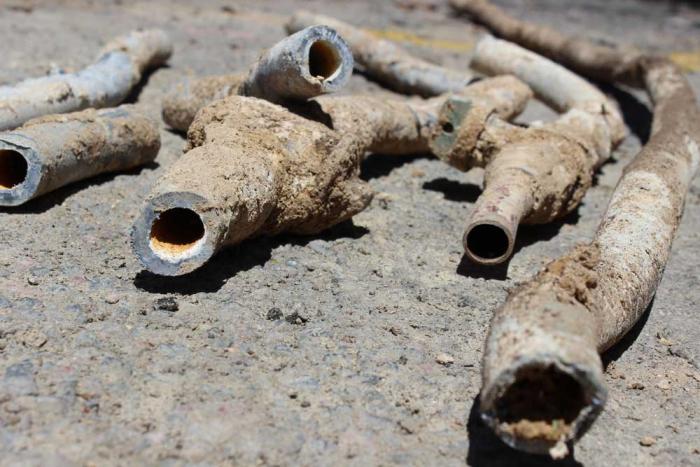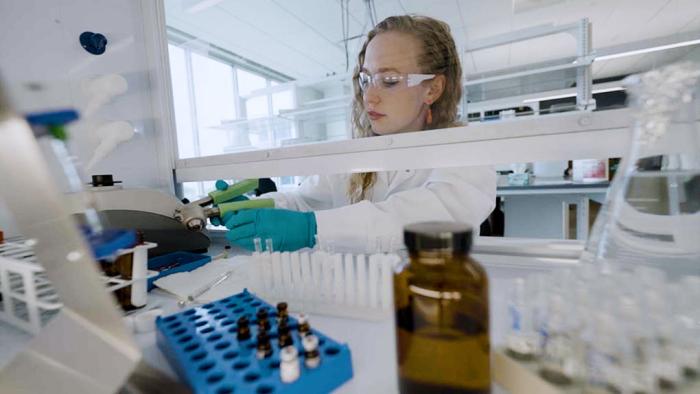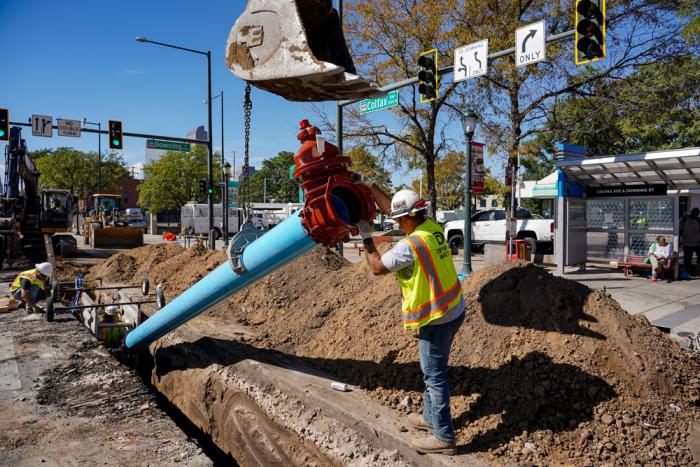Investing $1.9 billion into our water supply
Operating a water supply system that meets the challenges of today — and those decades in the future — means meeting day-to-day needs while upgrading infrastructure from the mountains to the network that serves customers across the Denver metro area.
It means ensuring the infrastructure is in place to capture and store water as it melts off mountain snowbanks. That the water can be guided through dams, tunnels and streams to treatment plants where it is cleaned for delivery to customers.
It means having crews skilled in replacing about 80,000 feet of water pipes buried under the city streets every year and able to respond to and fix breaks in older pipes 24/7/365.
And it means investing in large, multiyear projects to ensure the system continues to reliably provide clean, safe water to 25% of Colorado’s population.
Read how customers help invest in their water system.
Denver Water expects to invest about $1.9 billion into its water system during the next 10 years, from large projects to regular inspection and maintenance programs designed to ensure the system is flexible, resilient and efficient.
In addition to rates paid by customers, funding for Denver Water’s infrastructure projects, day-to-day operations and emergency expenses, like water main breaks, comes from bond sales, cash reserves, hydropower sales, grants, federal funding and fees paid when new homes and buildings are connected to the system. The utility does not make a profit or receive tax dollars.
In addition, major credit rating agencies recently confirmed Denver Water’s triple-A credit rating, the highest possible, citing the utility’s track record of strong financial management.
Join people with a passion for water at denverwater.org/Careers.
Here’s an overview of some of Denver Water’s recent and ongoing work:
Water storage
Work on the Gross Reservoir Expansion Project, the subject of more than 20 years of planning, got underway in April 2022. Expected to be complete in 2027, the project will raise the height of the existing dam by 131 feet.
The higher dam will nearly triple the amount of water that can be stored in Gross Reservoir, providing Denver Water with more flexibility to manage its water supply in the face of increasingly variable weather and snowpack patterns.
See some of the work that goes into preparing to raise a dam:
The additional storage capacity also will provide a greater balance between Denver Water’s separate north and south water collection areas.
Much of the work done on the expansion during 2022 and 2023 was site preparation and removing rock from the sides and bottom of the existing dam, preparing the area for the new concrete.
Why is Denver Water raising Gross Dam? Learn more.
Workers also have hydroblasted the face of the dam, removing a few inches of concrete, to leave a rougher surface for the new concrete to adhere to. Work to add concrete that will raise the dam will begin in 2024.
At the height of construction, there will be as many as 400 workers on-site, and when complete the dam will be the tallest in Colorado.
Lead Reduction Program
The water Denver Water delivers to customers is lead-free, but lead can get into drinking water as the water passes through old lead service lines that carry water from the water main in the street into the home.
The Lead Reduction Program, which launched in January 2020, is the biggest public health campaign in the utility’s history.
The program reduces the risk of lead getting into drinking water by raising the pH of the water delivered and replacing the estimated 64,000 to 84,000 old, customer-owned lead service lines at no direct cost to the customer. Households enrolled in the program are communicated with regularly and provided with water pitchers and filters certified to remove lead to use for cooking, drinking and preparing infant formula until six months after their lead service line is replaced.
Learn about the tiny devices used to test pH levels that protect customers from lead.
To date, Denver Water has replaced more than 20,000 customer-owned lead service lines at no direct cost to the customers.
In 2022, Denver Water successfully sought $76 million federal funding to supports the Lead Reduction Program. The money has allowed the utility to increase the pace of the replacement work, adding 3,000 to 5,000 lead service line replacements to the 2023 and 2024 work schedules, beyond the 4,500 already scheduled for replacement during each of those years.
Learn the top 10 things to know about having your lead service line replaced:
In March 2020, Denver Water also raised the pH of the water it delivers to customers to help reduce the risk of lead getting into water as it passes through customers’ internal plumbing that may contain lead.
Northwater Treatment Plant
Work on Denver Water’s new, state-of-the-art Northwater Treatment Plant next to Ralston Reservoir north of Golden in 2023 received multiple awards for the work that went into creating a culture of safety on a project that involved hundreds of people during its design and construction phases.
The treatment plant, scheduled for completion in 2024, will include 14 buildings and be able to clean 75 million gallons of water per day. Its design left room for the plant to be expanded to clean up to 150 million gallons of water per day in the future as needed.
Watch the latest update on the new Northwater Treatment Plant project:
During 2023 and 2024, work at the site includes finishing construction of buildings inside and out along with the delivery, installation and testing of treatment equipment and systems.
A major feature of the site visible from Highway 93 is the round, concrete tops of two giant water storage tanks. Most of the two tanks are buried underground and each is capable of holding 10 million gallons of clean, safe drinking water.
A new water quality laboratory
During summer 2023, Denver Water’s new water quality laboratory became fully operational, replacing an older lab built more than 60 years ago behind locked gates at the Marston Treatment Plant, located in southwest Denver near West Quincy Avenue and South Sheridan Boulevard.
The new lab is in the Hydro building on Colorado State University's Spur campus at the National Western Center north of downtown. Denver Water conducts more than 200,000 tests a year on the water it provides to customers.
Locating Denver Water’s water quality laboratory in the midst of CSU's new, public Spur campus ensures the utility’s water experts will be working near researchers, scientists and others tackling issues surrounding water, agriculture and public health that are important to the metro area, state and region.
Two other buildings are at the CSU Spur campus: Vida, which opened in January 2022 and focuses on life and public health; and Terra, which opened earlier this year and focuses on land and food.
The campus houses experts dedicated to exploring how the three disciplines intersect — and interact — with each other.
Ongoing investments in change
As the metro area grows and changes, it’s often an opportunity for Denver Water to upgrade older elements of its system.
Denver Water is continuing its investment in replacing about 80,000 feet of water mains under streets every year while also installing new water delivery pipe where needed. The utility has more than 3,000 miles of pipe in its system, enough to stretch from Seattle to Orlando.
In summer 2023, Denver Water began a major project: replacing 5 miles of water pipe under East Colfax Avenue, from Broadway to Yosemite Street. The pipe replacement work is taking place in advance of the upcoming East Colfax Bus Rapid Transit project, which is being led by the Denver Department of Transportation and Infrastructure.
During the replacement project, Denver Water also will replace any lead service lines the crews encounter. The project is expected to continue until the end of 2024.
And in recognition of the drought in the Colorado River Basin, Denver Water and several large water providers across the basin in 2022 committed to substantially expanding existing efforts to conserve water.
Among the goals outlined in the agreement is the replacement of 30% of the nonfunctional, water-intensive Kentucky bluegrass in our communities — like the decorative expanses of turf grass in traffic medians — with more natural ColoradoScapes that include water-wise plants and trees that offer more benefits for our climate, wildlife and the environment.
Denver Water is working with partners — including local governments, fellow water providers and experts in water use and landscapes — to develop programs that will help transform our landscapes and expand our indoor and outdoor conservation efforts.
The utility also started work transforming its own landscapes, including about 12,000 square feet around its Einfeldt pump station near the University of Denver.
See the ColoradoScaping project underway at Denver Water’s Einfeldt pump station:
The area, formerly filled with useless Kentucky bluegrass that was only visited when it was mowed, is being transformed into a diverse ColoradoScape. The new landscape incorporates water-wise plants, prairie grasses and cooling shade trees that will offering rich habitats for birds, pollinators and wildlife that live in the metro area.
The work is being done with help from a Transformative Landscape Change Challenge grant from the Colorado Water Conservation Board and working with Boulder nonprofit Resource Central. Once the plants are established, Denver Water expects to reduce water use at the site by about 166,000 gallons of water a year.
The project is an example of how Denver Water is planning for a warmer, drier future by partnering with our community to build a system and a landscape that supports our customers and encourages them to thrive now and in the future.




